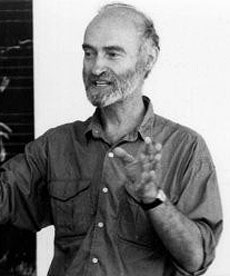Christian Wolff (composer)
Christian Wolff ( born March 8, 1934 in Nice) is an American composer with German parents. He studied classical philology at Harvard University and has taught the subject and music until his retirement at Dartmouth College in New Hampshire.
Life
Christian Wolff was born as the son of the first Kafka publisher Kurt Wolff in France, but grew up in the U.S., where he spent his school years in New York from 1941. Since 1948, he had piano lessons with Grete Sultan, who had been his parents recommended by pianist Katja Andy. When he Grete Sultan in 1950 showed his first compositions, they thought he should take lessons from John Cage, with whom she was a close friend. So he learned through it already as a 16- year-old composer John Cage and know his circle, to the Morton Feldman, Earle Brown, the pianist and composer David Tudor, the dancer and choreographer Merce Cunningham, as well as painters such as Robert Rauschenberg, Mark Rothko or Philip Guston included.
Wolff presented Cage the book I Ching, which had moved his father. The book had a decisive influence on Cage's compositional practice more. Wolff was the youngest in a group of musicians and composers, based on the New York School of the said Abstract Expressionist painters - the first of Europe independently created art form in America after the Jazz - soon became known as and whose most outstanding minds Cage, Feldman, Brown and Wolff were.
Since 1999, Wolff is a member of the Academy of Arts in Berlin.
Wolff later became involved politically, which was reflected in a number of works. Examples are Accompaniments for a singing pianist with texts from the Book of China: The Revolution Continued, Bread and Roses for violin based on the eponymous song of the women's movement or the series of works Peace Marches.
Selections
- Duo for Pianists I ( 1957)
- For 1, 2, or 3 people (1964)
- Edges (1968 )
- Prose Collection ( 1968-71, c. 1986 & 1997)
- Burdocks ( 1970-71 )
- Changing the System ( 1973-4 )
- Exercises (1973 - )
- Wobbly Music ( 1975-76 )
- I Like to Think of Harriet Tubman (1985 )
- Eight Days a Week Variation ( 1990)
- Percussionist Songs ( 1994-95 )
- Pianist - Pieces ( 2001)
- Ordinary Matter ( 2001-04 )
- John Heartfield ( Peace March 10 ) (2002 )
- Microexercises (2006)
Further Reading
- (1998) Cues: Writings & Conversations / Notes: writings and talks, Cologne: Music Texts (eds. ) G. Gronemeyer & R.Oehlschagel.
- (2001) Robert Carl, Christian Wolff: On tunes, politics, and mystery, in Contemporary Music Review. Issue 4, pp. 61-69.
- (2002) Frank J. Oteri, A chance encounter with Christian Wolff, in NewMusicBox [United States]; 3/11: 35; Mar. http://www.newmusicbox.org/page.nmbx?id=35fp00
- (2004) Stephen Chase & Clemens Gresser, ' Ordinary Matters: Christian Wolff on his Recent Music', in Tempo 58/229 ( July ), pp. 19-27.
- Stephen Chase ( Ed.): Changing the system: the music of Christian Wolff, Farnham [ ua]: Ashgate, 2010, ISBN 978-0-7546-6680-6
- Moritz von Bredow: Rebellious pianist. The Life of Grete Sultan between Berlin and New York. ( Biography, 368 pp., 60 fig - Many references to Christian Wolff, John Cage and the New York music scene ) Schott Music, Mainz, 2012, ISBN 978-3-7957-0800-9.









